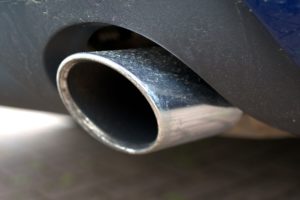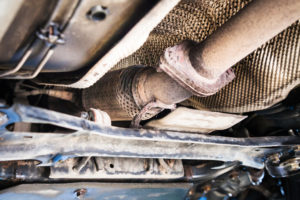Exhaust repair is quite common in our shop, but what is the exhaust system and how does it go sour?
What Your Exhaust System Does:
 In order for a car to run, fuel and air must be burned in the combustion chamber, producing at least six different emissions, including the extremely harmful gases carbon monoxide, nitrogen oxide, and nitrogen monoxide.
In order for a car to run, fuel and air must be burned in the combustion chamber, producing at least six different emissions, including the extremely harmful gases carbon monoxide, nitrogen oxide, and nitrogen monoxide.
The car exhaust system is responsible for removing these emissions, allowing the car to be safe for drivers and passengers as well as the environment. There are two other crucial functions the exhaust system serves.
The first is to quiet the loud explosive noises of combustion. The other is to ensure your car is running with the most fuel efficiency.
Exhaust Parts and Common Exhaust Repairs:
The exhaust system is a series of chambers and pipes that starts at the engine and ends at the back of the car with the tailpipe.
Most cars have one exhaust system, although vehicles with eight-cylinder engines may have two exhaust systems, one for the right cylinders and one for the left. In this case, it is important that both systems are running efficiently, though they are basically the same. There are five main parts in a typical exhaust system.
Exhaust Manifold:
The manifold is at the forefront of the exhaust system, attached to the engine at the cylinder head. It is responsible for venting the exhaust gases from multiple cylinders into one pipe. The manifold also burns any leftover fuel not properly burned in the engine.
Oxygen Sensor:
Located in or near the manifold, the oxygen sensor sends oxygen level readings to the car’s computer, and from here, the computer regulates how much fuel is needed in the engine for the best fuel efficiency.
Exhaust Pipes:
These pipes carry exhaust through the entire system. They connect to the manifold at the start and end with the tailpipe where exhaust makes its final exit outside the vehicle.
Catalytic Converter:
This important piece comes after the exhaust manifold and serves to convert the harmful carbon monoxide and hydrocarbon gases into carbon dioxide and water vapor, making the exhaust safer for the environment. Although a car will run without a converter, it is illegal to drive without one in most states.
Muffler:
As its name suggests, the muffler acts as a silencer to the extremely loud noises of combustion occurring throughout the exhaust system. The combustion sound waves travel through the system until they reach the muffler, usually connected to the tailpipe of a car.
The muffler is a metal box containing a series of tubes called baffles, some perforated, that the waves must travel through, losing energy along the way and thus becoming quieter. At the back of the muffler is the resonator, which, through built-up pressure cancels out the sound waves.
Other mufflers work by using fiberglass to absorb the sound waves. The best use both methods. Changing a car’s muffler will give the exhaust system a distinctly different sound.
Exhaust Repair and Potential Problems:
Now that you know a bit about the components of an exhaust system, I can tell you about the most common exhaust repair we perform in the shop.
Common Exhaust Repair: Rust
Rust is one of the biggest problems the exhaust system faces. With rust comes a greater likelihood of cracked or broken exhaust parts causing an exhaust leak.
Common Exhaust Repair: Salt and Corrosion
Corrosion is one of the most common exhaust repair causes in Pittsburgh. Living in an area that uses salt on icy roads may increase the risk of such problems, as salt causes corrosion. If this is the case, hosing down a car’s bottom every few weeks in the winter months may help. Take care not to overdo this, however, as continually leaving excess water on the car will also cause rust.
Common Exhaust Repair: Water Vapor
If your driving typically involves short trips (less than fifteen miles) or a lot of driving in stop and go traffic, your exhaust system may also be at greater risk of a problem because water vapor in the system condenses to water once the car has stopped.
Common Exhaust Repair: Inactivity
If the car has not been running for very long the pipes are not hot enough to evaporate the water and the condensed water causes rust. Exhaust system leaks can also occur due to cracks from normal usage.
Signs You Have a Problem:
Do you smell fumes? This is cause for concern and may be an indication that you have an exhaust leak.
Roll down your windows to minimize the fumes you are inhaling. It may be best to pull over and contact a mechanic.
Hissing or popping noises coming from the exhaust system may also be an indicator of a leak or a muffler that needs replacement. Even if there does not appear to be a problem with your system, it is a good idea to ask your mechanic to look it over when you are in for other repairs or your regular oil change.
Remember that the deadly carbon monoxide has no odor, so there may be a leak you are not detecting. And of course, catching a problem early can save lots of money in the long run. A rattling or buzzing noise may indicate that a heat shield around the exhaust pipes or catalytic converter is loose.
If you have been noticing less fuel efficiency, it might be an indicator of a malfunctioning oxygen sensor or a plugged catalytic converter. Because the exhaust system is such a crucial part of car function and safety it is important to take care of any issues quickly.
